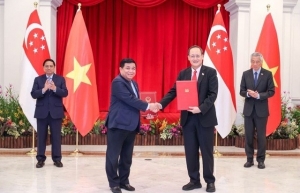Innovation name of the game in Singaporean tourism
How do you foresee the prospects of tourism exchange between Vietnam and Singapore in the coming years, considering the recent developments in both countries’ tourism sectors?
 |
| Serene Ng, area director for Vietnam at the Singapore Tourism Board |
The prospects are promising. Singapore has taken proactive measures to adapt and refine our tourism offerings to meet the evolving needs and preferences of travellers.
The Vietnamese market is an important source of tourists for Singapore due to several factors, including the emerging number of quality travellers and Singapore’s attractiveness as a great leisure and business travel destination, as well as the strong economic ties between the two countries.
In recent years, there has been a steady increase in the number of Vietnamese tourists visiting Singapore. Vietnam is among the top 15 source markets to date and we received over 200,000 visitors in January-June this year.
Looking ahead, with Singapore’s continued efforts to enhance its appeal and adapt to changing travel preferences, combined with Vietnam’s growing interest in international travel, the prospects for tourism exchange between Vietnam and Singapore in the coming years remain positive. Both countries can leverage their strengths, collaborate on initiatives, and create mutually beneficial partnerships to further enhance tourism cooperation and exchanges.
How is the Singapore Tourism Board (STB) actively engaging with the Vietnamese travel industry and key stakeholders to promote Singapore as a destination for Vietnamese tourists?
The STB actively engages in partnerships with key industry players in Vietnam to promote Singapore as the preferred destination for Vietnamese travellers.
We have formed strategic partnerships with travel agents, including Ben Thanh Tourist and Vietravel, to develop joint marketing campaigns and attractive tour packages. These partners are focused on devising tactical promotions and enhancing tour offerings to entice Vietnamese visitors to Singapore.
In addition to travel agents, we have established a collaborative relationship with Vietnam Airlines to boost visitor numbers from Vietnam. This partnership involves various initiatives, details of which will be announced at a later stage.
Alongside these partnerships, we have leveraged collaborations with popular Vietnamese influencers such as Tran Quang Dai and Quang Vinh. They have produced relatable content that showcases the unique experiences and rich culture of Singapore, which aims to inspire Vietnamese tourists to choose Singapore as their next travel destination.
Additionally, we introduced SingapoRewards, an initiative that offers complimentary leisure experiences to short-term international travellers. This initiative allows Vietnamese visitors to redeem a free experience from a curated list of unique hidden gems, aiming to enhance their appreciation of Singapore’s diverse tourism offerings.
Moving forward, STB remains committed to exploring more collaborative opportunities to further strengthen tourism exchanges between Singapore and Vietnam. This could include joint marketing campaigns, trade and business events, product development and innovation, as well as promoting sustainable tourism practices.
The specifics of these future partnerships will be shaped through ongoing dialogues and collaborations with relevant stakeholders in both countries.
How do you expect the extension of e-visas, starting from August 15, to impact tourism exchanges between Vietnam and Singapore?
The extension of tourist e-visas from 30 to 90 days is a significant development for the speedy recovery of Vietnam’s tourism. The e-visa extension aligns with the broader goal of strengthening tourism cooperation between Vietnam and other countries, including Singapore.
It reflects Vietnam’s commitment to welcoming international travellers and could potentially spark discussions between the two countries on mutually beneficial tourism initiatives.
Given the increasing awareness and demand for eco-friendly travel experiences, what measures are being taken in Singapore to highlight commitments to sustainable tourism practices, and how is this being communicated to potential tourists?
Travel priorities are changing, and Singapore is adapting its strategies to cater to these shifts. Wellness and sustainable travel, underscored by a new emphasis on health and environmental concerns, are growing trends. Singapore is positioning itself as a destination for holistic wellbeing experiences and is integrating sustainability into its tourism offerings.
The Singapore Green Plan 2030, a national blueprint for sustainable development, is a key driver for these initiatives. Aligned with this, attractions like Jewel Changi Airport and Gardens by the Bay embody sustainability through engineering feats and eco-friendly practices.
Resorts World Sentosa and various hotels, like PARKROYAL on Pickering and Marina Bay Sands, have also implemented measures such as eliminating single-use plastics and installing energy-saving systems.
The city’s culinary scene, with restaurants like Open Farm Community and Labyrinth, champions sustainable food practices, while partnerships with platforms like ClassPass provide visitors wellness-centric experiences.
 | Vietnam establishes task force to propel economic partnership with Singapore Prime Minister Pham Minh Chinh gave the green light to Decision No.912/QD-TTg on August 2, ushering in a comprehensive cross-agency task force with the key role of putting the MoU governing the Green and Digital Economic Partnership between Vietnam and Singapore into action. |
 | Sustaining mutual growth through new networks Vietnam and Singapore are intensifying their bilateral ties in new fields with focus set on innovation, energy, and sustainability. Jaya Ratnam, Singaporean Ambassador to Vietnam, provides analysis on how this cooperation has been implemented and benefited the two countries. |
What the stars mean:
★ Poor ★ ★ Promising ★★★ Good ★★★★ Very good ★★★★★ Exceptional
 Tag:
Tag:
Related Contents
Latest News
More News
- Wine securing a stronger foothold in Vietnamese market (June 09, 2025 | 10:50)
- Vibrant Vietnamese cuisine fit for global tastes (June 09, 2025 | 10:42)
- Vietnam can be global hot spot in 2025 (January 29, 2025 | 00:38)
- Promoting tourism and hospitality with sustainability (January 28, 2025 | 09:00)
- Vietnam centres on eco-luxury tourism and hospitality (January 28, 2025 | 02:06)
- Growth prospects for Vietnam’s event tourism in 2025 (January 28, 2025 | 01:18)
- Core values drive success at Marriott (January 24, 2025 | 16:00)
- Hoteliers to prioritise eco-luxury (January 04, 2025 | 09:00)
- Vietnam upscale tourism on the rise for 2025 (December 30, 2024 | 12:03)
- Addressing concerns can shape green hospitality (December 04, 2024 | 10:24)






















 Mobile Version
Mobile Version